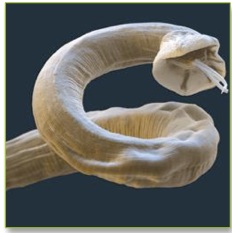News
Make sure your pets stay worm free
by on May 1st, 2012
Category: News, Tags:
Does worming your pets seem like a constant battle? Unfortunately you can’t vaccinate against worms, so regular worming treatment is the only way to ensure your pets stay worm free! Until recently our main concerns regarding worms have been with
roundworms and tapeworms. However a new and serious threat to dogs is lungworm infection.
 Roundworms are spaghetti-‐like in appearance and live in the small intestines. The adult worms shed thousands of tiny eggs, which pass out in the faeces and contaminate the environment. Dogs and cats are re-‐infected by unwittingly ingesting the eggs. The eggs also pose some risk to children if accidentally swallowed.
Roundworms are spaghetti-‐like in appearance and live in the small intestines. The adult worms shed thousands of tiny eggs, which pass out in the faeces and contaminate the environment. Dogs and cats are re-‐infected by unwittingly ingesting the eggs. The eggs also pose some risk to children if accidentally swallowed.
Tapeworms also live in the small intestines and shed
segments containing eggs, which pass out in the faeces. An intermediate host, such as small rodents or fleas, must then eat the eggs. Cats catch and eat small rodents and both cats and dogs swallow fleas as they groom, so re-‐infecting
themselves with tapeworms.
Lungworm – caused by the parasite Angiostrongylus vasorum, only affects dogs. Adult lungworms live in the pulmonary arteries and right ventricle of the heart. Affected dogs can show a wide range of symptoms – some severe, including coughing, fits, blood clotting problems and lethargy. However many pets may show no obvious symptoms. The lungworm parasite is carried by slugs and snails which act as an intermediate host. Dogs sometimes eat snails, but even snail slime trails left on grass and dog toys can be infected with lungworm eggs. Feline lungworm is less common
and severe than in dogs.

The good news is that by following a few simple rules worms can be controlled: worm your pet regularly, use regular flea control, prevent dogs eating snails and slugs, and clean up faeces. Finally, please let us advise you on the best worm and flea treatments

